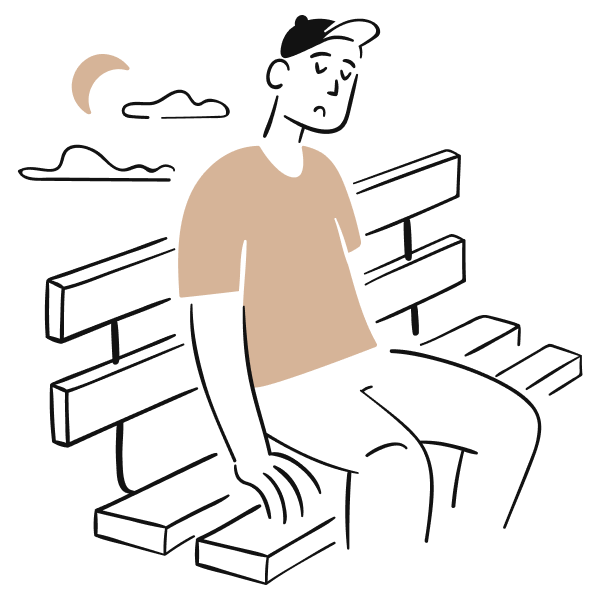PTSD
PTSD is short for post-traumatic stress disorder. It’s a collection of long-term symptoms that occur after you experience a traumatic event and aren’t able to process it effectively. But what exactly happens when you have PTSD? And what is complex PTSD?
What Is PTSD?
Post-traumatic stress disorder (PTSD), also called chronic post-traumatic stress, or post-traumatic stress disorder, is a condition when you aren’t able to process trauma effectively resulting in long-term symptoms. Its normale to experience a shocking or disturbing event at some point in your live and to experience certain symptoms afterwards. Usually, these will go away by themselves. If you aren’t able to process trauma effectively, this may result in long-term symptoms: You could develop PTSD.
A traumatic event doesn’t always lead to PTSD. Some people experience symptoms after trauma, but are able to process it effectively after a certain period of time has passed.
If your symptoms last longer than a month, or only present themselves a long time after the distressing event, then this is what we’d refer to as PTSD.
If you have PTSD, your symptoms are intense and they won’t go away by themselves. You’ll find that you’re still experiencing symptoms over four weeks after the distressing event has taken place. In some cases, the symptoms won’t present themselves until years after the event. You’ll relive the event over and over again, avoiding people and places so you don’t have to be reminded of it.
If you develop PTSD, you become afraid of danger that has already passed and is no longer happening in the present. You’re perpetually alert and ready for action. This means you feel tense, are easily startled, and experience a range of other psychological and physical symptoms.
What Can Cause PTSD?
Post-traumatic stress disorder is caused by a traumatic event that you’re unable to process effectively. Trauma occurs when you witness or experience an event that is very shocking or distressing. For example, this could be a car accident, assault, hospitalization, or sexual abuse. This causes a psychological wound: trauma. The trauma then becomes a source of stress.
Read here to learn more about the causes of PTSD.
What Are Potential Effects of PTSD?
PTSD affects your life in many different ways. Since you’re more likely to become angry or irritable, and to think negative thoughts about yourself, it also affects your family, relatives, and friends. Additionally, your work may suffer. Mainly because you’ll struggle to concentrate the way you could before. Some people with PTSD are temporarily unable to go to work or school. It’s also possible to develop alcohol problems and addictions to certain drugs as a result of PTSD.
Read here to learn more about the effects of PTSD.
Symptoms of PTSD
If you’re suffering from PTSD, it may manifest itself in the following symptoms:
- You don’t want to think about the distressing memory anymore, but you keep constantly reliving it.
- You avoid things that remind you of the event.
- You experience anxiety, pain, and sadness.
- You’re irritable, quick to anger, or even aggressive.
- You have trouble concentrating.
- You suffer from nightmares.
- You feel tense.
- You suffer from negative thoughts and feelings.
Exact symptoms vary from person to person. There are other symptoms in addition to the ones listed above, as well as physical symptoms of post-traumatic stress disorder and symptoms related to complex PTSD.
What Is Complex PTSD?
Complex PTSD is a severe form of PTSD. We use the term complex post-traumatic stress disorder when the following symptoms are present in addition to the ones we’ve previously mentioned:
- You have extremely low self-esteem. You constantly think you aren’t good enough and have low self-confidence.
- You find it difficult to trust other people.
- You struggle to control your emotions. Your emotions abruptly fluctuate.
- In some cases, dissociation: The tension in your head builds up to such an extent that you’re no longer able to be consciously present in the moment.
Complex PTSD is more likely to occur if the traumatic events were extremely intense; took places over a long period of time; you were abused or mistreated as a child; or you are a war veteran, for example.
Recovering from PTSD
How can you recover from a traumatic event more quickly?
- Seek support from someone you trust and talk about your symptoms.
- Do things that help you relax and take your mind off everything, such as exercise and sport. Also do things that you used to find relaxing, even if they feel a little pointless now.
- Carry on with your life. Go to bed at the same time each night and get up around the same time every morning. Also eat your daily meals at set times. It’s always good to have structure in your life.
- Don’t turn to alcohol, drugs or sedatives for relief. In the long run, this will only cause you more problems.
Want to talk?
-
Do you need someone to answer your questions, offer immediate help, or just provide a listening ear? A psychologist can help you. Do you have questions about treatments? Call us on +31207717996 and we will immediately give you personal advice and help creating a treatment plan.
-
At iPractice, we use blended care. This is a combination of online and offline therapy. You’ll have face-to-face conversations with a consulting psychologist and you’ll also have access to an online psychologist in between. This means that you can ask questions and share your thoughts whenever you like.
-
PTSD can be treated with Cognitive Behavioral Therapy and/or EMDR. Your treatment will be tailored to you and your symptoms. With the right treatment you can make a good recovery from PTSD. Click here to learn more about treatments for PTSD.







